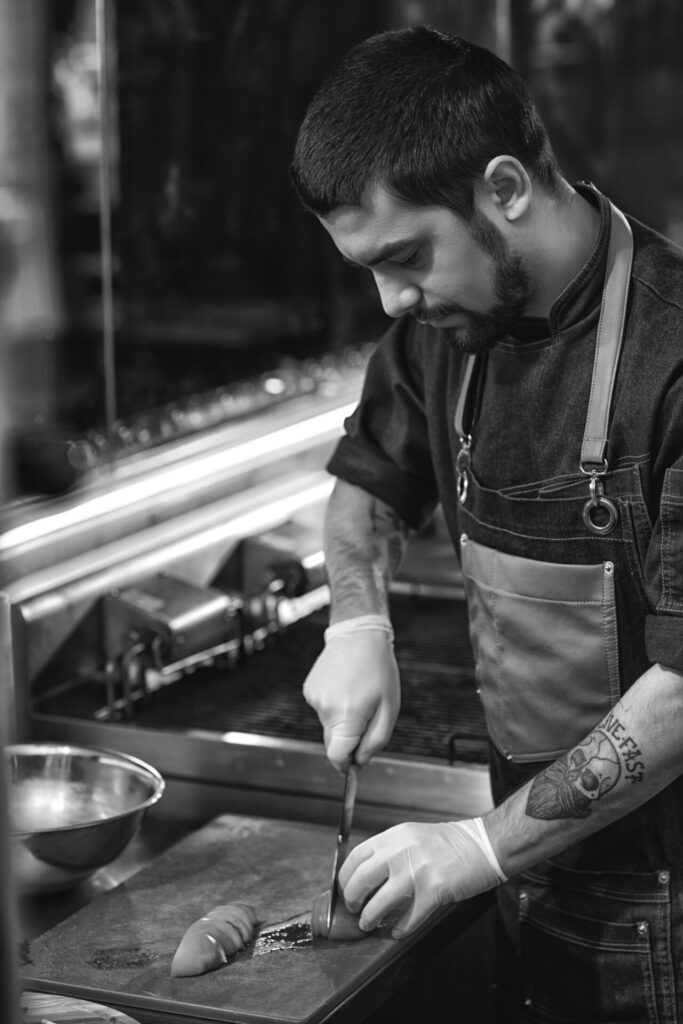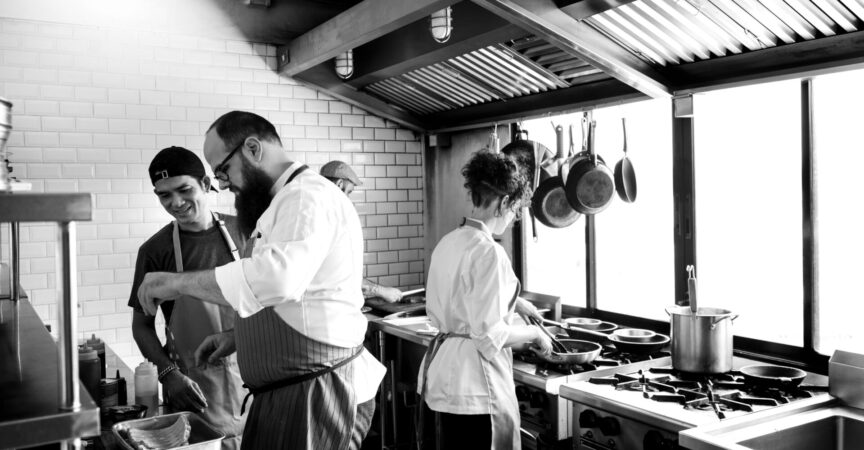Imagination & Innovation
Industry leaders, visionaries and tastemakers share their hopes and dreams for the future of foodservice.

Restaurants Canada asked over 100 RC Show speakers, thought leaders, and innovators to share their raw views on where the Canadian foodservice industry is headed, or where it should be. These perspectives from the frontline visionaries and experts who are actively shaping the industry matter because they are not only informed by their extensive experience but also by their intimate understanding of emerging trends and consumer expectations.
By listening to these voices, we gain a deeper understanding of the critical areas that will drive future success, from sustainability and technological innovation to enhancing consumer experiences and fostering inclusive workplace cultures. Their contributions provide a roadmap for navigating the complexities of the modern foodservice landscape, ensuring that businesses are not only prepared for the future but are also positioned to thrive.
Analyzing and distilling their responses involved organizing the data into key themes, assessing
their importance, and visually presenting the insights in a clear, engaging format to facilitate informed
decision-making and strategic planning. Here are some of the highlights and key takeaways…
The Burning Question:
Looking ahead, what trends or developments do you foresee shaping the industry in the next few years?
The Consensus:
A holistic approach integrating sustainability, technology, consumer-centric strategies, and workforce development is essential for the industry’s future success.
Sustainability (30%)
Invest in Sustainability.
Emphasize eco-friendly practices, focus on reducing food waste, prioritize local and sustainable sourcing.
“There will be a greater emphasis on sustainability, with consumers and businesses alike prioritizing eco-friendly practices and ethical sourcing. Women, known for their holistic approach, will play a significant role in driving these changes.”
“Sustainability in the sourcing of our product will not only be a trend but a necessity.”
“Sustainability will increasingly become an expectation among Canadian consumers, who will also be looking for evidence you are being sustainable. A claim is not enough anymore.”
“Sustainability is no longer a trend. It’s a real and necessary part of the industry that needs focus. Tailored experiences will continue to grow to give everyone the night out that they need and deserve. And I hope a continuation of accessibility aims, to make everyone — no matter how they identify in the world — able to experience the hospitality industry on their terms.”
“Making an impact in the community is a key trend that will shape the industry in the coming years – we all have a part to play in supporting sustainable practices and making an impact in the fight against food insecurity.”
“There is a broad misconception that sustainability is an expense for your business. We will see an increasingly broad understanding that in fact the opposite is true. Doing good is good for business. Just like Too Good To Go, where the more bags we save, the more value we create for partners, and the more Co2e we reduce. It’s a win-win-win.”
“Important topics like humanity, food waste, supporting equality, sustainability, biodiversity.”
I foresee menu engineering really shaping the industry in years to come – it will dictate how restaurants manage inflation and rising costs and they can maintain their value proposition. I also expect to see the emergence of more small, intentional concepts – restaurants with micro-menus, small footprints and hyper-local offerings.”
“Increasing consumer awareness and concern about environmental issues will drive the demand for sustainable practices in the gastronomy industry. This includes sourcing locally, reducing food waste, using eco-friendly packaging, and adopting sustainable farming methods.”
Technology & Innovation (25%)
Embrace Technology.
Integrate AI and automation, utilize advanced data analytics, enhance operational efficiency and customer experience.
“The industry will continue to integrate technology, enhancing customer experiences and streamlining operations. Having worked myself in the Food Tech Corporate world- I can assure you that tech in our industry is not going to stop at just robots & food delivery systems. It’s a lot more complex than that.”
“Everybody loves talking about AI, and we are playing in that space as well; but the fundamentals of a successful business will always be the end experience of the customer when they interact with your business, website, app or product. Technology should be in support of enhancing the customer experience and not just deployed because it is cool. The future will be tech enabled but the most successful companies will deploy technologies that are customer centric.”
“Artificial intelligence (AI) technologies will play a significant role in automating various aspects of restaurant operations, such as inventory management, scheduling, and customer service. Chatbots, voice assistants, and AI-driven analytics tools will enable restaurants to operate more efficiently and cost-effectively.”
“AI and other tech helping revolutionize how we interact with brands and experiences.”
“New and exciting ways to make it easier for operators to interpret information will be a game changer for the industry over the next few years. There is so much data available, and not enough time to review it. This can lead to missed opportunities to optimize the business.”
“More technology! Automation and real-world use cases for AI, more personalization for the guest based rich data, the continued evolution of restaurant business models to meet consumers when, where and how they want to get food.”
“The rapid technological growth we’re seeing globally—AI, robotics, real-time analytics, and automation—are all going to have an impact on hospitality. The question is what form that will take and how the impact will be received by guests, but I’m confident forward-looking operators and vendors will use these tools to create even more amazing guest experiences.”
Customer Experience (20%)
Enhance Customer Experience.
Offer personalized dining experiences, create unique and memorable dining settings, focus on customer-centric approaches.
“I feel like the mid-level hospitality experience is being reshaped right now and in the next few years to come.”
“I feel like customers and consumers are going to want (and receive) more customizable experiences.”
“I hope it’s a commitment to guest experience. Technology can provide our industry with plenty of efficiencies and improve productivity, but reinvesting those resources into the guest service experience is going to set the good apart from the great.”
“Co-creation and collaborations with chefs on the creation of menu items is very trendy as of late within the QSR segment.”
“Reliable neighborhood restaurants that are lively in ambiance (since so many people now watch movies from home, shop from home, play video games from home, order take-out to eat at home). When people choose to dine out, they don’t want proper fine dining as much as they want to feel a sense of people gathering and being in the midst of lively conversations and people energy. Restaurants of the future need to exude hope, not exclusivity.”
“Destination neighbourhood bars in small communities.”
“I foresee the rise of more franchises with brands that are powerhouses offering the best in food, aesthetics and trends.”
“In lifestyle and societal trends, there is a dominant theme here across all ages and sectors, but most particularly in residential and commercial spaces: North Americans are desiring connection and authenticity, with a strong focus on health, wellness and sustainability.”
“People are going to be looking at small businesses more so now to provide them with quality products they need. They will want an experience when purchasing.”
“Consumers continue to look for more and more experiences.”
“I see sit down restaurant service becoming less in demand than experiential dining.”
People & Culture (15%)
Promote a Positive Culture.
Foster diversity and inclusion, promote a positive workplace culture, focus on mental and physical well-being of staff.
“I believe there is a strong cultural shift happening, where the newer generation is guiding the older ones on ways to move forward in the industry with increased respect and clearer boundaries. It is shifting the culture and showing us that it has direct results on staff retention and healthier work-life balance. This shift will also affect how establishments will need to plan out continued education and training, as well as team development.”
“DEI is slowly fading and not the “hot topic” or in the new cycle as much. But inequalities still exist. As an industry, we need to work together to do better, be more diverse, inclusive and equitable to ensure everyone feels like they belong in their workplace. We need to push for the development of sustainable DEI strategies and keep learning and unlearning. Customer behaviours are always changing and if we continue to practice empathy and listen to learn more deeply, then we can break down barriers, and build more purpose-driven strategies, plans and deliverables that support and include those that have been traditionally ignored or not included.”
“As health and wellness becomes a forefront movement, I hope the industry makes moves to prioritize people over profits.”
“I see a trend of changing the culture in the restaurant industry. Making the kitchen more inclusive and respectful space for all. It’s something I believe in and something I will always push for.”
“Those with a personal brand will Level Up.”
“I foresee ownership having a huge shift in the next few years in this industry. Ownership for the BIPOC community is growing, thanks to incubators, mentorships, and funding.”
“Beyond the kitchen, I am here to change the notion that for years, media has showcased that chefs are the new rockstars. The party lifestyle, drugs, and rock & roll like personas. I challenge these old stereotypes and we should celebrate chefs as the athletes they truly are and support the movement of incorporating healthy habits into our lifestyle that will positively affect both our personal and professional lives. The kitchen demands physical stamina, mental acuity, and relentless dedication. The kitchen is not just a stage; it’s a battlefield where chefs need to work with precision, navigate intense heat, and orchestrate symphonies if you will. It’s time we acknowledge the athleticism required to create culinary masterpieces and use this vision as a tool to inspire and educate the next generation of leaders to come.”
“Side hustles are going to continue increasing as individuals will be more inclined towards a gig economy. Employment contracts will need to be more flexible to allow this. As labour shortages are still prevalent, we will be seeing this trend continue to some degree for the food service, accommodation, and tourism industry. As the new law is being put in place for salary transparency, we will see salaries being added to the job descriptions (no crystal ball needed here)!”
“Proper certifications and paid training programs for your staff.”
“A heavier push for more diverse leadership representation, with women taking on key roles in shaping the industry’s direction. Women do have unique perspectives and collaborative nature will which drive positive change and inclusivity.”
“I am very excited to see the industry continue to embrace and value the voices and experiences of traditionally underrepresented groups in ways that create tangible outcomes.”
“Linking values with work – linking our work to the personal values that drive us allows us to work every day with passion and conviction in what we do and to create an environment that supports the values that are important to us.”
“Better stability—work, family, pleasure. Looking ahead, better work-family-life balance is what is going to help the industry move forward and create stability.”
Economic Efficiency (10%)
Implement Cost-Effective Solutions.
Manage rising costs through streamlined menus, explore innovative pricing models, implement cost-effective solutions.
“Tech and returning to hospitality value not just saying what people want to hear.”
“Streamlining menus will be even more critical in keeping costs down and focusing on your most popular and profitable items. This optimization ensures you’re always improving operational efficiencies and enhancing the overall customer experience.”
“I don’t know what the future holds, but I know that I would like to see more restaurants and/or food service establishments with pay-what-you-can systems/specials. Going out to eat and having nice dining experiences outside of the home are becoming less and less accessible as the cost of just about everything rises.”
“Consumer sentiment is obviously the biggest driver of all, and creating value through differentiation is required at all levels of the industry.”
“As labour costs continue to rise and technology continues to develop, we’re going to need to figure out how we continue to prioritize the “service” part of the word foodservice. How do we treat employees, customers, vendors, and partners? Recognizing our shared humanity is essential to our success.”
“With climate change looming as an existential threat, there will be an increasing need to strengthen business resiliency against this and an expectation from consumers to reduce carbon emissions. Sourcing locally will become increasingly vital, even for something like seafood which is often imported from far flung corners of the world. Industry professionals should pay attention to local harvesters and fish farmers and make use of the plentiful and delicious seafood that we have in our backyard.”
“I’d look into changes in consumer demand, from new flavours to cleaner products and ready-to-eat. Also crucial to pay attention to supply chain issues and leverage new technologies.”
“Further emphasis on sustainability, health and wellness, customization, and value and loyalty.”
“As we see an increase in the prices of food and sundries, I see us returning to the basics, executed well, and presented in a new fashion. Cost effective dishes and experiences will continue to rise in popularity as we face such things as inflation, and the cost of goods continue to rise.”
“Cash flow is going to become increasingly important. Operational costs continue to rise, and profitability is at a low in the industry. Staying cash positive will allow hospitality owners to stay nimble and ahead of unexpected expenses. Consumers attention spans are also getting shorter, which means that there will be continued emphasis on unique concepts that delight customers. Restauranteurs will need to stand out to draw customers in.”
“Doing less for more. Maximizing impact and specialty. Focussing on the experience as a whole.”









